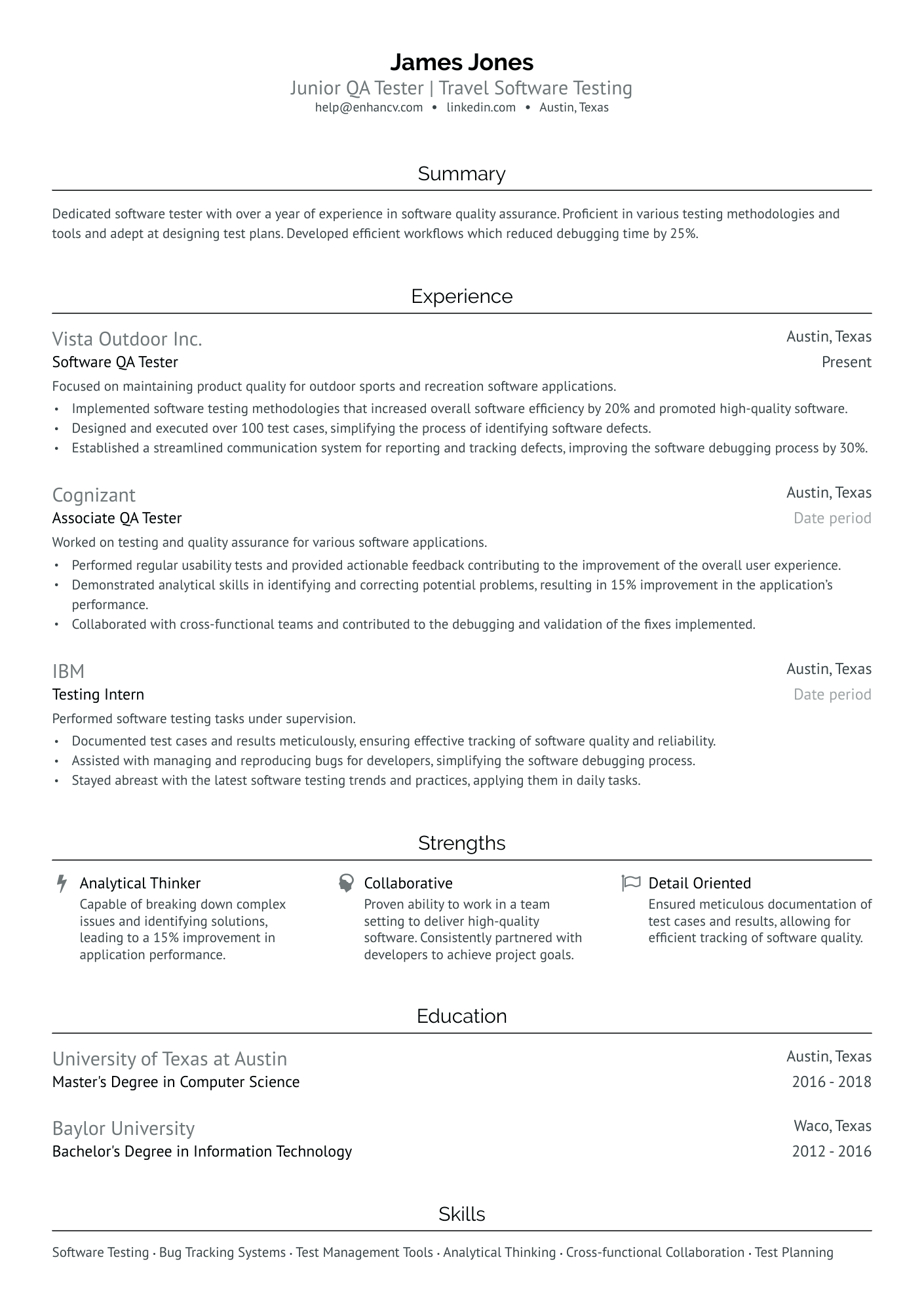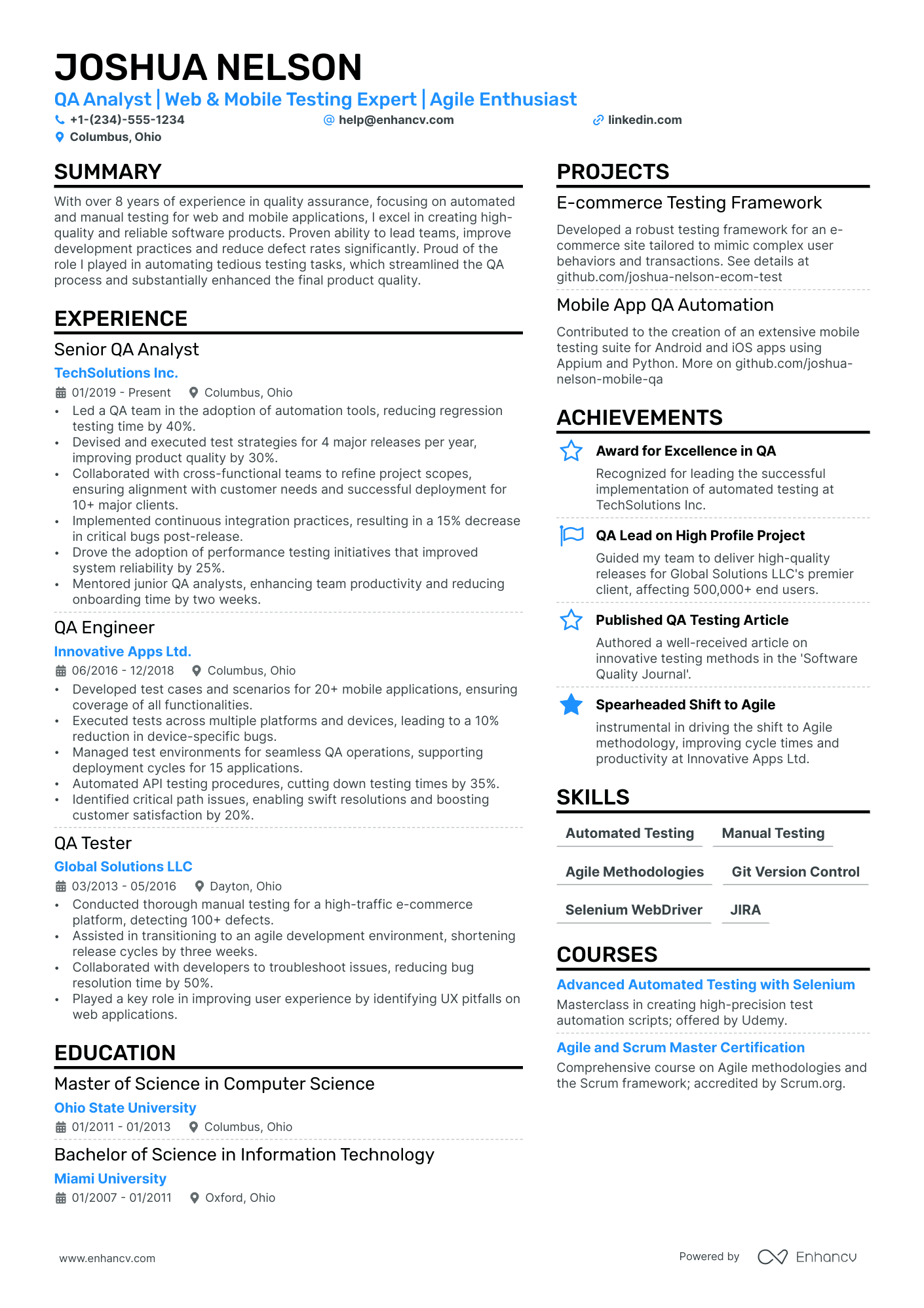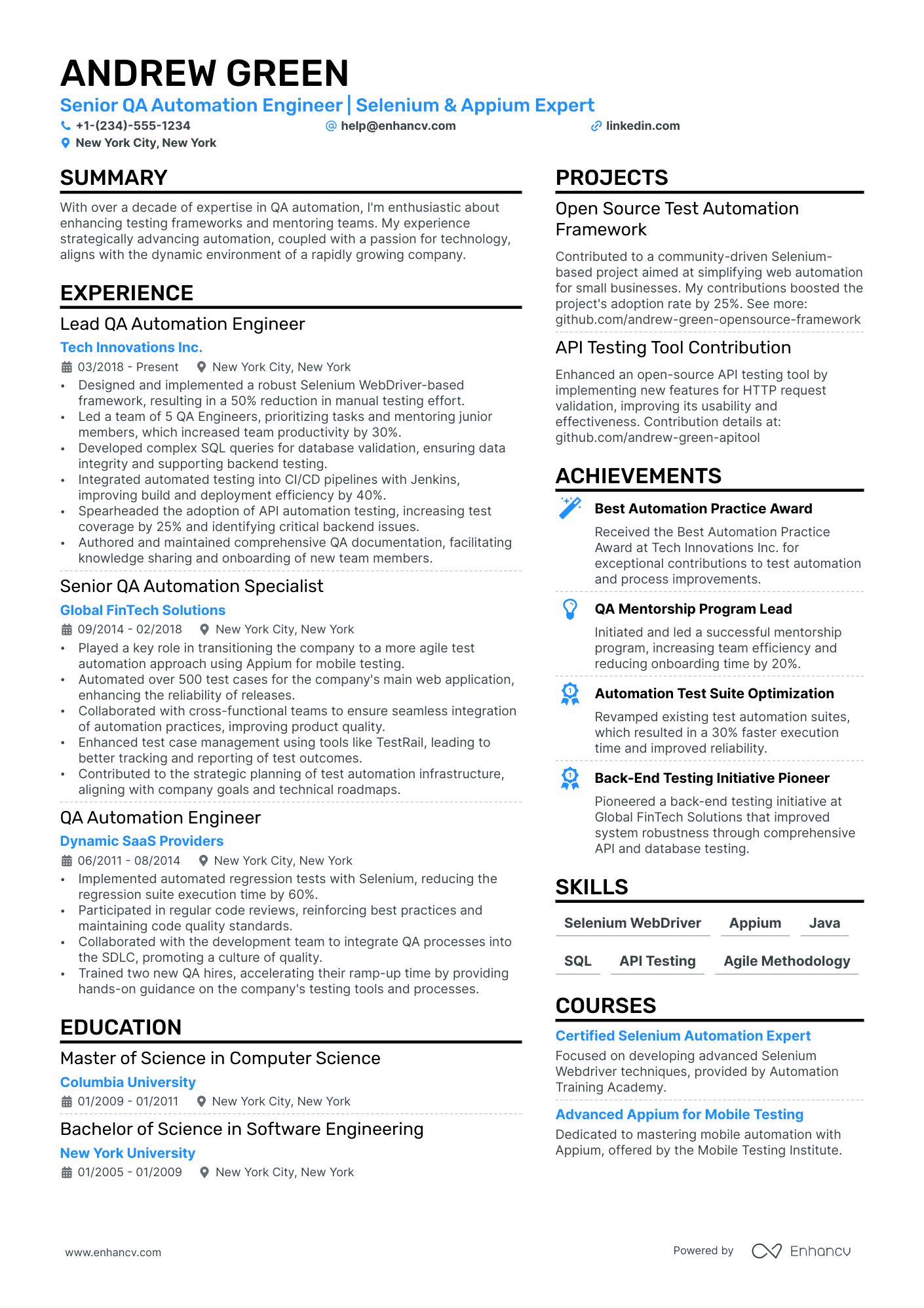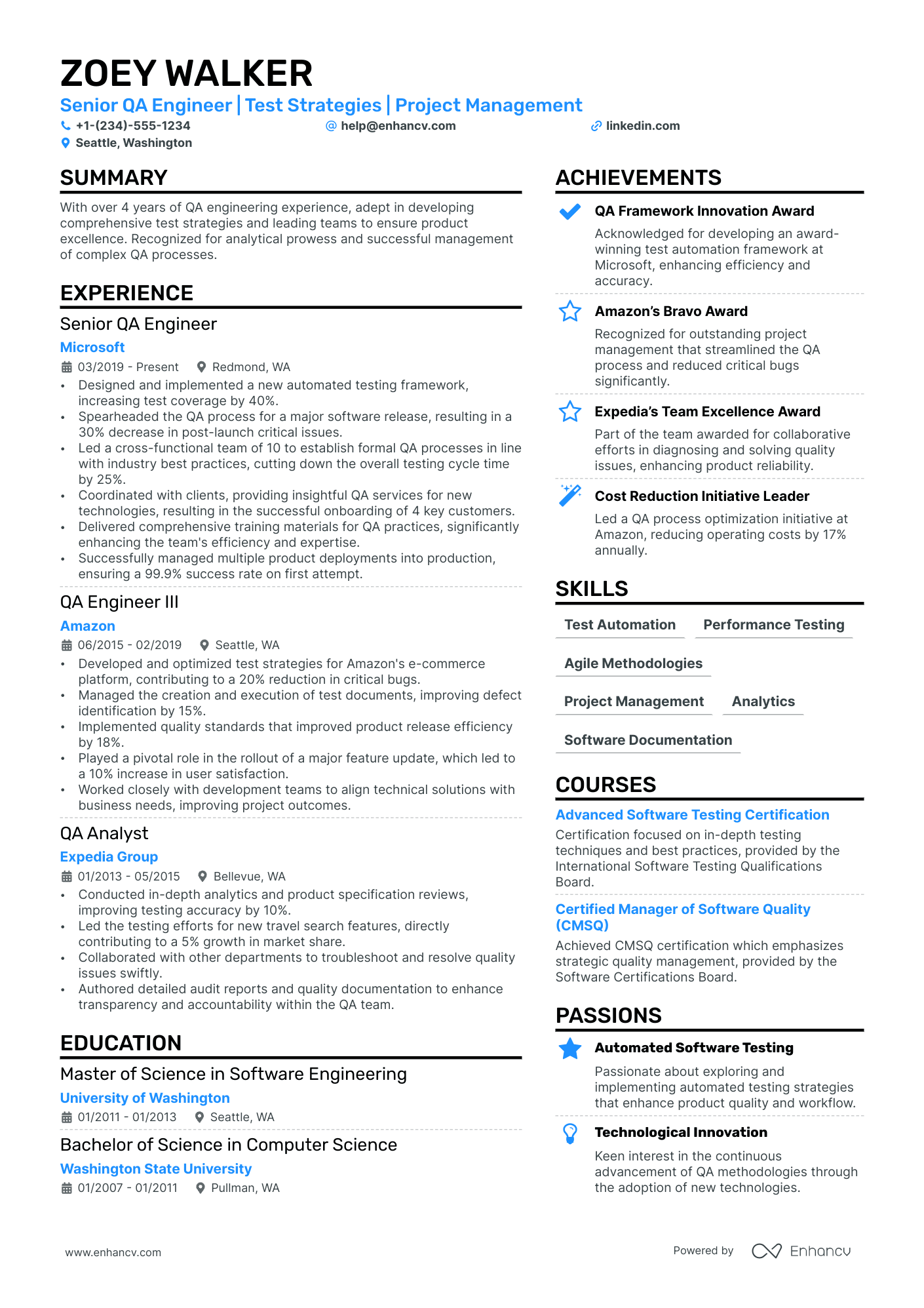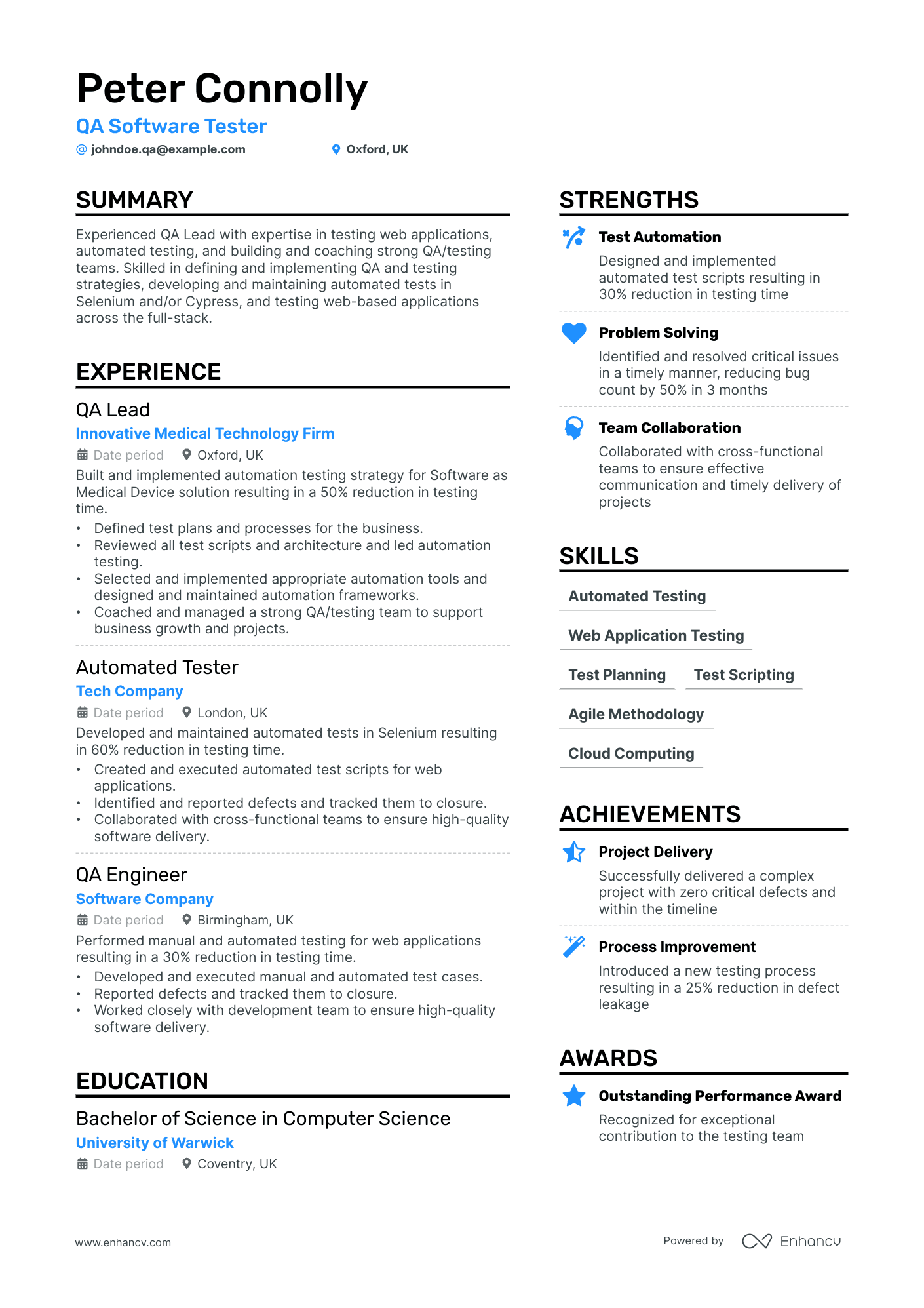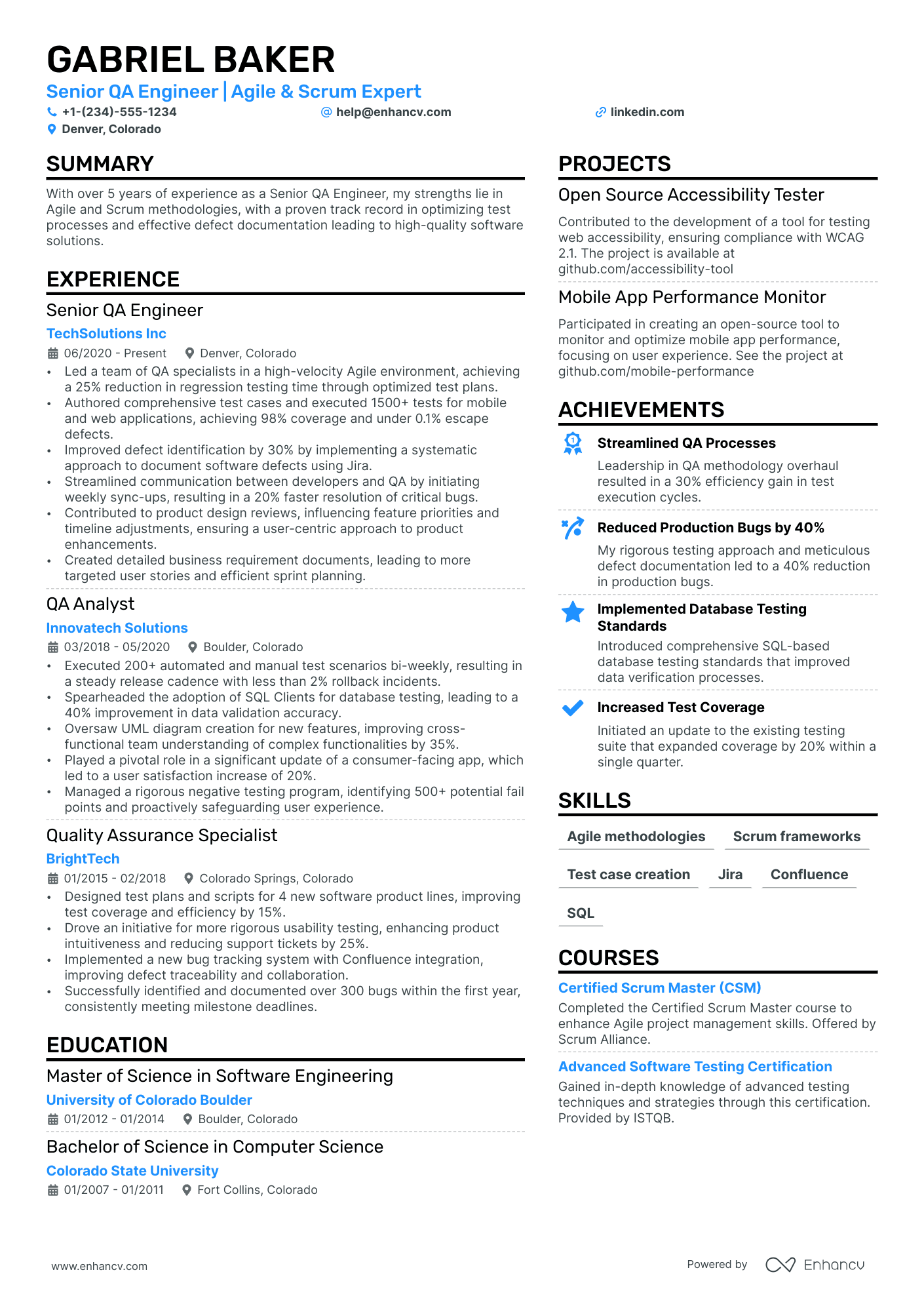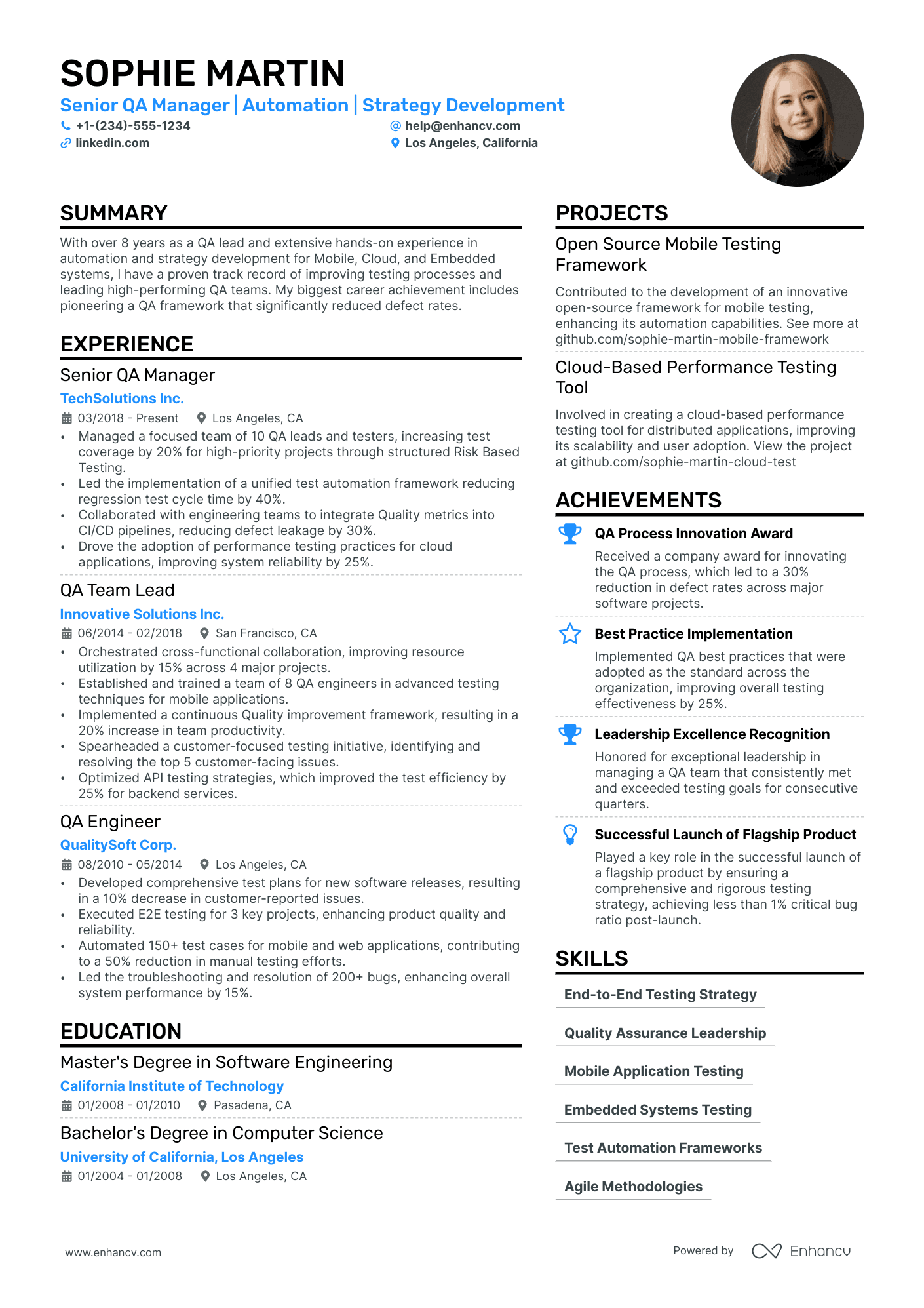According to the US Bureau of Labor Statistics, the QA testing field is set to grow by 25% from 2022 to 2032, creating more than 400,000 new jobs. QA testing serves as an accessible gateway into the tech industry, offering alternatives like manual testing for beginners and automation for those with coding skills.
Quality assurance is rich with varied entry-level opportunities and supports continuous professional growth and education. Although it may be stressful at times, keeping a balanced personal and work life is crucial for long-term success in this fast-paced field.
Testing is like a game of chess, you have to think ahead of the developer.
Huib Schoots
To start playing this game within the computer science industry, your first move will be to impress the recruiters with an outstanding resume. To reach that interview stage, you'll need a resume that underlines your QA expertise. Learn from our guide on how to build a resume that shows your QA testing skills and also catches the eye of recruiters.
Here’s what we’ll go over:
- How to choose a modern and professional resume template
- Ways to present your past job experiences to align with QA testing positions
- Key skills to feature on a QA tester resume
- Important certifications and software proficiencies to underscore.
- Pro tips for additional sections to boost your resume.
If the QA tester role isn't the right one for you, check out our other related guides:
- QA Lead Resume
- Software QA Engineer Resume
- QA Analyst Resume
- QA Automation Resume
- Computer Engineer Resume
- Database Developer Resume
- QA tester Cover Letter
How to format a QA tester resume
To get noticed in the QA testing field, it’s crucial to nail the resume format. Here are three formats perfect for your quality assurance resume:
- Reverse chronological resume: Perfect for those with significant QA manual or automation testing experience, this format lists your recent roles first and works backward.
- Functional resume: Ideal if you're new to QA testing, changing careers, starting out, or have employment gaps. It focuses on your skills rather than job history.
- Combination resume: Combines elements of both chronological and functional formats. This allows you to underscore relevant skills and achievements at the top, followed by a brief work history. It's great for emphasizing experiences that match the QA role you're aiming for.
Want a resume that recruiters can’t ignore? Organize it using these useful tips.
- For creating a professional QA tester resume, consider using a double-column template to make your resume visually appealing and easy to read.
- Use simple fonts like Rubik, Calibri, or Volkhov in sizes 10 to 12 for a neat look on your QA CV.
- Ensure you have at least 1-inch margins and use accent colors like gray or blue.
- Include your name, phone number, location, and professional email address in the header of your resume.
- Put your LinkedIn profile link on your resume if it's current and applicable. Also, add a photo of yourself only if the job ad requires it.
- Convert your resume to a PDF to ensure it keeps its format on any computer or phone.
PRO TIP
Resumes longer than two pages put off 17% of hiring professionals. Although longer resumes might work for some jobs, in the business sector, they reduce your chances of getting hired by 72%. So, it's best to keep your resume to one page when applying for a job.
With these strategies, you can build a resume that performs well with ATS systems and draws the attention of recruiters hunting for a QA tester.
Give your resume a competitive edge by using our AI tool for a free, detailed 16-point evaluation.
Is your resume good enough?
Drop your resume here or choose a file. PDF & DOCX only. Max 2MB file size.
After deciding on the structure, we'll build a QA manual or automation tester resume that draws attention. We'll go over the following key sections.
The top sections on a QA tester resume:
- Contact information: Provides essential details for recruiters to quickly follow up, including name, phone number, email, and LinkedIn profile.
- Skills section: This is important to show your technical and interpersonal skills specific to QA testing, such as knowledge of testing tools, debugging, and teamwork.
- Work experience: This section should detail your previous roles, responsibilities, and achievements in the field of QA testing, providing recruiters with an insight into your professional background and proficiency.
- Certifications & training: Including this information gives credibility to your QA knowledge and skills, especially if you hold certificates like ISTQB, Selenium, or JIRA.
- Projects & achievements: Underlining your key projects and accomplishments in QA testing helps to prove your applied skills and the impact you can bring to a role.
Let's take a closer look at what recruiters expect in these sections of your resume and how they evaluate them.
What recruiters want to see on your resume:
- Experience with testing tools like Selenium or JIRA that shows technical readiness for the role
- Understanding software development life cycles (SDLC) because they’re crucial for performing effective testing and ensuring quality.
- Knowledge of various testing techniques that help QA testers adapt and use methods like black box, white box, and regression testing.
- Attention to detail because detecting and fixing bugs requires careful inspection to avoid defects in the final product.
- Communicating clearly is key for QA testers, as they need to work with different teams to ensure timely and accurate information flow.
A tester is a translator between the developer and the customer.
James Whittaker
Regardless of your resume's format, the experience section typically comes first. We'll guide you in tailoring it for a quality assurance tester resume.
How to write your QA tester resume experience
Show hiring managers how you implement QA testing principles in real-world projects. In your resume's work experience section, emphasize your quality assurance skills and key achievements instead of just detailing your responsibilities. Start each bullet point with an impactful action verb to describe your roles and successes. Make sure to tailor your resume for the specific QA position by using keywords from the job ad.
51% of job seekers use buzzwords, clichés, and pronouns inappropriately in their resumes.
Using buzzwords effectively can help you secure an interview by showing key competencies, but overuse can disengage hiring managers. Instead of vague terms like "team player" or "detail-oriented," show your skills with specific examples.
Example QA tester job offer
To demonstrate the importance of adjusting your resume for specific job applications, let's consider a scenario: You find a software developer position advertised on a tech job board and decide to apply. This example underlines why it's vital to customize your resume to fit the job you're targeting.
The Software Quality Assurance Tester performs advanced analysis and application testing work involving the daily operations and activities of testing teams within the Independent Verification and Validation (IV&V) section of IT-SEDS (Information Technology – Statewide Education Data System).
This position will work with the Information Technology CRM Testing team to provide the following Software Testing Services:
- Analyze user requirements, design documents, and other documentation to develop test plans and detailed test cases.
- Execute automated functional and regression test cases, report and document all issues, test cases ran, test results, and testing summaries in detail
- Perform manual testing and data validation
- Perform advanced SQL queries to analyze and manipulate data
- Work with the development team and customers to clearly understand the functionality under test to help determine test cases and clearly communicate issues found
- Review user requirements, procedures, and problems to automate applications or to improve existing systems.
- Collaborate with the project team for sprint/release work on tasks such as providing testing effort estimates, resolving defects or issues, and providing status on work assignments or issues.
CANDIDATE SKILLS AND QUALIFICATIONS
Minimum Requirements: Candidates who do not meet or exceed the minimum stated requirements (skills/experience) will be displayed to customers but may not be chosen for this opportunity.
Years Required/Preferred Experience
- 7 Required Testing complex web applications
- 7 Required Testing all phases of software development life-cycle
- 3 Required Database/ SQL Language
- 3 Required XML, JSON, API Testing
- 2 Required Automation Testing experience
- 4 Preferred Test automation experience using open source technologies and/or in-house frameworks
- 4 Preferred Experience with test frameworks like Junit, TestNG
- 3 Preferred WAPT Pro or other performance testing tools
- 1 Preferred Previous experience with Zypher Scale preferred
- 1 Preferred Previous experience with Jira preferred
Let’s check out the work experience of two people going for this job. It looks like the first applicant might need to work harder.
- •Analyzed user requirements, design documents, and other documentation to develop test plans and detailed test cases.
- •Executed automated functional and regression test cases, and documented all issues, test cases ran, test results, and testing summaries.
- •Performed manual testing and data validation.
- •Performed advanced SQL queries to analyze and manipulate data.
A plain list of duties doesn't make any applicant stand out. Here's more why this resume entry doesn't meet expectations:
- Too vague: The entry "analyzed user requirements, design documents, and other documentation to develop test plans and detailed test cases" is too broad. It doesn't show any specialized skills or specific experience needed for QA roles.
- Not enough detail: It mentions executing automated functional and regression test cases but doesn't specify the tools used, like Selenium or JIRA. This lack of detail means it doesn't align with job requirements.
- Technical skills overlooked: The company values knowledge of advanced SQL queries, but this resume doesn’t elaborate on the depth of experience with SQL or other relevant technologies.
Overall, the entry doesn't present a strong case for the candidate. The next person, however, goes above and beyond by providing specific numbers and details.
- •Developed test plans and cases from user requirements, boosting test coverage by 30%.
- •Executed 1,000+ automated tests, documenting all issues and results, increasing efficiency by 25%.
- •Performed manual testing and data validation, cutting critical defects by 20%.
- •Used SQL queries to analyze and manipulate data, improving processing speed by 15%.
- •Collaborated with teams to understand functionality, reducing testing cycle time by 10%.
Here’s why this entry catches the attention of recruiters:
- Quantifiable achievements: This candidate demonstrates significant results with real numbers—developed test plans and cases from user requirements, boosting test coverage by 30%, and executed 1,000+ automated tests, increasing efficiency by 25%.
- Relevant experience: The resume shows how the candidate performed manual testing and data validation, cutting critical defects by 20%.
- Technical proficiency: Used SQL queries to analyze and manipulate data, improving processing speed by 15%. This highlights the candidate's strong technical skills.
- Collaboration skills: Collaborated with teams to understand functionality, reducing testing cycle time by 10%. This demonstrates the ability to work effectively with others to achieve project goals.
- Impactful results: Each responsibility includes clear metrics, showing not just what the candidate did, but how well they did it and the difference it made. This approach is sure to catch the eye of recruiters.
This resume demonstrates how the candidate's experience meets the job requirements. Follow these tips to make your experience section impactful with clear metrics.
How to quantify impact on your resume
Using numbers and percentages can vividly illustrate how your QA work has improved software performance. This approach highlights your real impact, like minimizing bugs or optimizing test processes.
Here are some examples to showcase your achievements in previous QA positions.
- Include the number of test cases created, executed, and managed in order to demonstrate your practical experience and productivity.
- Indicate the percentage of defects you were able to detect and fix, showcasing your effectiveness and thoroughness as a QA tester.
- Mention the number of testing tools you’re proficient in, suggesting your versatility and adaptability in handling various QA testing platforms.
- Highlight the amount of time saved by automating tests, showing your ability to increase efficiency and productivity.
- Quantify the amount of possible client-reported issues prevented due to your testing, proving your contribution to user experience and satisfaction.
- State the number of critical system failures prevented during your testing, which illustrates the value and impact of your work on the system's stability.
- Detail the number of software releases you were involved in testing, indicating your experience with real-world software deployment.
- Specify the number of bugs detected and fixed per software release, showing your efficiency in ensuring the quality of the software.
How do I write a QA tester resume with no experience
Many people start their QA careers as manual QA testers before advancing to more complex test automation roles. Manual QA testing is often an entry-level position, while automation roles typically require coding knowledge, such as Python. If you want to start working in the computer science field, manual QA is the easiest way. In this role, you’ll mostly perform manual tests to find bugs in software applications and record the outcomes.
Don’t worry if you lack professional experience. Instead, emphasize your transferable skills, education, and personal interests such as solving puzzles, playing chess, etc. Highlight any relevant projects or informal experiences that demonstrate your abilities in testing and quality assurance.
Here are several ideas:
- Objective statement: Craft a brief statement that conveys your passion for QA testing, underscores your relevant experience, and outlines your career goals. Keep it clear and engaging, ideally within 3 sentences.
- Education: List any formal education in computer science, technology, or related fields. Highlight courses relevant to QA, such as software testing, coding, or data analysis.
- Internships: Mention any internships you've completed related to QA testing, whether paid or unpaid.
- Projects: This is crucial, especially if you lack professional experience. Describe any QA projects on your resume you've worked on, including personal experiments, class assignments, hackathons, or volunteer work. Detail your role, your approach, and the results.
- References: Provide references from teachers or mentors if you have them, or simply state that they’re available upon request.
How to list your hard and soft skills on your resume
When tailoring the skills section of your QA resume, aim for a clean and impactful layout. Include both your technical knowledge, such as experience with Selenium and JIRA, and your soft skills, like problem-solving and collaboration. Also, don’t forget to emphasize your proficiency in programming languages, especially Python.
Best hard skills for your QA tester resume
- Selenium
- JIRA
- LoadRunner
- QTP/UFT
- Postman
- TestRail
- Cucumber
- Bugzilla
- SQL
- Java
- Python
- SOAPUI
- Jenkins
- Apache JMeter
- JavaScript
- Ruby
- Git
- Appium
- TestComplete
- Zephyr
Besides your hard skills, talk about your key people skills. It’ll help recruiters see that you’re a well-rounded candidate who fits in with the company culture.
Best soft skills for your QA tester resume
Now, let's look at another crucial part of your application—your education.
How to list your education and certifications on your resume
QA testing is a dynamic field, with new methodologies, tools, and best practices constantly being introduced. On your resume, the education and certifications sections are essential for demonstrating your fundamental knowledge and commitment to staying up-to-date with industry developments.
Your education section should emphasize coursework and training in areas critical to QA testing, such as software testing, programming, and data analysis.
When applying for entry-level QA testing positions, it's important to highlight relevant coursework and certifications, like ISTQB or CSTE.
Follow these steps to set up the education section on your resume for a QA testing position:
- Degree title: List the degree you earned related to QA testing.
- School name: Provide the name of the educational institution you attended.
- Graduation year: Indicate the year you graduated or expect to graduate.
- Major: Highlight your field of study, such as computer science, IT, or software engineering, which are relevant to QA roles.
- Relevant certifications: Include any QA-specific certifications you hold, like ISTQB Certified Tester (CTFL) or Certified Software Tester (CSTE).
- Additional training: Mention any additional courses or workshops you completed that enhance your QA expertise, such as automation testing or advanced SQL.
- GPA: If your Grade Point Average is above 3.5, consider adding it to highlight your academic excellence.
Here’s how you can show your education on a resume for a QA testing job.
- •Specialized in software testing and quality assurance methodologies.
- •Completed a capstone project focused on automating test processes and improving software reliability.
- •Graduated with honors.
- •Led a student project on developing a testing framework for school software applications.
Including your QA testing certifications on your resume underlines your qualifications and proactive approach to learning. Ensure you:
- List each certification you’ve obtained.
- Name the organization that issued each certification.
- State the expiration date if it applies.
Check out these esteemed QA certifications:
Best certifications for your QA tester resume
Treat these certifications as helpful hints. Make sure to review the job description to find out which ones are required for the QA tester role you're applying for. Emphasize your most recent certifications to attract hiring managers' attention.
How to write your QA tester resume summary or objective
When applying for a QA tester job, a strong summary or objective can really make your resume stand out. Both are key to quickly catching the recruiter's eye and showing that you're a good fit for their needs.
Here's the difference:
- Summary: Give a quick overview of your top professional achievements and relevant skills in 3 to 5 sentences. This is best if you have a lot of experience in QA testing.
- Objective statement: Keep it brief, around 3 sentences, focusing on your career goals and why you're interested in this role. This works well if you're new to quality assurance testing, changing careers, or getting back into the workforce.
Want to see some examples? Let’s start with a resume summary example below:
PRO TIP
Write your resume summary or objective without using a first-person narrative.
Let’s move forward with an example of an objective statement.
Here are some tips for crafting a compelling resume summary or objective for a QA tester role:
- Personalize it: Tailor your summary or objective to reflect the specific QA tester position and the company’s culture you’re applying to. Show how your skills match their needs.
- Use real numbers: Boost your credibility by quantifying your accomplishments. For example, you could include, "Enhanced test coverage by 25% through innovative testing strategies using Selenium and JIRA."
- Focus on technical skills: Highlight essential QA testing skills such as proficiency in automation tools like Selenium and JIRA, and strong analytical skills to identify and resolve defects efficiently.
- Emphasize relevant experience: Mention any specific experience you have in manual and automated testing, as well as any relevant certifications like ISTQB or CSTE.
Spending time on a precise and tailored summary or objective can make your resume much more effective.
Additional sections for a QA tester resume
To make your QA tester resume more interesting, choose one or two additional sections to give recruiters a fuller picture of who you are, both as a professional and an individual:
- Volunteering: Be sure to list any volunteer experience, especially if it's related to technology or community involvement. This showcases your dedication and readiness to apply your skills in unpaid settings.
- Passions: Share your hobbies and interests, such as participating in board games clubs or martial arts, to show a well-rounded personality.
- Language skills: Mention any additional languages you speak and demonstrate your ability to work with a diverse team.
- Recognitions: Highlight any awards you've received in the QA field, such as employee of the month, project completion awards, or contributions to major releases.
How to put a projects section on a QA tester resume
This section showcases key QA projects, outlining their goals, the strategies implemented, the roles you played, and the results achieved. It provides a clear picture of each project's impact and success.
Here's an example:
- •Developed and implemented automated regression tests using Selenium WebDriver, resulting in a 40% increase in test coverage and a 60% reduction in testing time.
- •Conducted thorough manual testing for a banking application, identifying and documenting 150+ critical defects and ensuring compliance with industry standards.
- •Led a performance testing project for a mobile application using JMeter, which improved app performance and reduced load times by 30%.
Key takeaways
Now that you've got the basics, let's recap the key points for your QA tester resume:
- Use a professional resume template, simple fonts, and a clear layout to make your resume visually appealing.
- Include your contact details in the resume header for easy access by recruiters.
- Tailor your resume to the specific QA tester role.
- Mention specific experiences in manual and automated testing, along with relevant certifications like ISTQB.
- Emphasize essential QA testing skills like proficiency in Selenium and JIRA.
- Include key quality assurance projects with goals, strategies, roles, and outcomes.
- Add sections like passions, language skills, and references to give a fuller picture of yourself.
QA Tester resume examples
Explore additional qa tester resume samples and guides and see what works for your level of experience or role.
By Experience
Junior QA Tester
By Role
